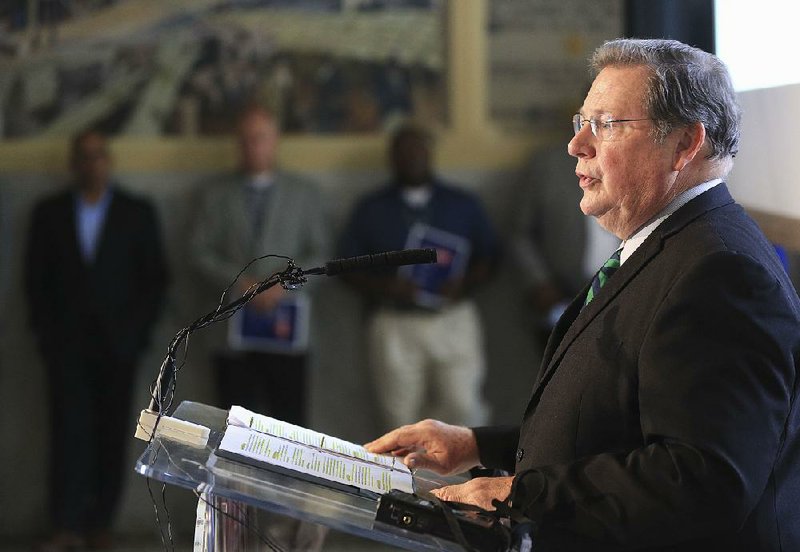Little Rock will enlist a public relations firm to help recruit police officers from other Arkansas agencies and will give those recruits a $10,000 signing bonus, Mayor Mark Stodola said Thursday while summarizing a strategy to make the city less violent.
Stodola and city officials have repeatedly referred to at least 70 vacancies within the Police Department as one factor contributing to a surge in violent crime over the past several months. Crime in the capital city has drawn statewide aid and national attention after a shooting at the downtown Power Ultra Lounge club on July 1 in which 28 people were left injured.
The recruiting initiative was one of about 36 new and existing methods to address crime that the mayor discussed as he sought to “paint a complete portrait” of those efforts during a 55-minute news conference at City Hall.
The news conference was based in part on feedback from residents who have addressed officials at public meetings, organized forums, grocery stores and restaurants, he said. Four black residents pointedly criticized Stodola and city directors at the first city board meeting after the nightclub shooting.
“When one tragic incident that is an aberration totally obscures all of the good things that are happening in our city, it blinds us to all of the other things that are going on,” Stodola said. “This press conference is being held to let our citizens know of all the things the city is doing as your elected representatives to make the city safe.”
Dozens of community activists, residents and reporters in attendance heard Stodola talk about more aggressive law enforcement, filling out the Police Department’s ranks, tapping into federal programs and tightening state laws.
He also spoke of increasing outreach to troubled communities, generating more participation in neighborhood and mentor programs and expanding job opportunities.
After the address, Stodola told reporters that he’s not sure how much money the measures will cost the city.
But he said newer initiatives collectively exceed hundreds of thousands of dollars when including pay for civilians hired to respond to minor traffic accidents and handle minor criminal complaints by phone, tactics meant to free up officers for more serious calls.
Much of the spending will not require approval from the city’s Board of Directors.
Stodola also said the city would devise data points to monitor whether the programs work but that there’s not a specific time frame in which to evaluate the current course.
“The reality is we have to do something, and we’re going to do something,” Stodola said. “We re-evaluate constantly to see whether or not our advertising plan works and we get officers that meet our standards. We’ll continue to work on our skills training and all of those programs. But I firmly believe people don’t know those exist.”
Little Rock will pay convicted felons to speak with teenagers and young adults who have gone astray in disconnected neighborhoods.
The city will offer a $10,000 reward to tipsters who provide information that leads to an arrest in any homicide case, a departure from the case-bycase cash reward offerings, and work with the prosecutor’s office to relocate witnesses who fear retaliation.
The mayor called on state lawmakers to heighten witness-intimidation penalties and pay for GPS monitoring for parolees living in Little Rock. He said he will work with the Pulaski County prosecutor’s office to revisit how domestic violence cases are prosecuted, with the goal to reduce the pressure on victims to testify.
Stodola said he will present city directors with an ordinance requiring video cameras in event centers, convenience stores and other select businesses. He called on businesses to expand summer job opportunities for young people and urge residents to seek out and report burned out streetlights.
John Gilchrist, president of the Little Rock Fraternal Order of Police, expressed support for specific programs, including the incentive package offered to new officers that has in the past been contentious.
New officers receive a $5,000 signing bonus for graduating from the police academy and another $5,000 if they buy a home in Little Rock. That same deal is now being offered to experienced officers that Little Rock attracts from other departments, Stodola said.
Gilchrist, who said the true shortfall in the Police Department is 93 officers, said the rank-and-file is somewhat “disgruntled” that they’re not eligible for bonuses awarded to new officers but that they generally welcome the idea of relief.
“We’ve got a lot of people out there working a lot of overtime, overtime they don’t even want anymore,” Gilchrist said, noting that officers struggle to get approval for vacation time. “We have people having to use sick leave in order to get any time away.”
Capi Peck and Doris Wright, two of the six city directors who sat nearby as Stodola gave his address, said it would be important to monitor the programs’ effectiveness going forward.
“Most of this is not new,” Peck said of the programs. “I think it’s an awareness thing. …Everybody’s eyes are wide open.”
Wright said she wants to see a preliminary report on the strategy in six months and a full report within a year. She said she also wants to know how crime statistics change and wants the city to show progress in cleaning up blighted neighborhoods.
“I’m glad he rebranded it ‘Little Rock for Life,’” Wright said of what Stodola called the strategy. “That shows some thought, some consideration went into all of this. I hope if the citizens of Little Rock get nothing out of this, they know the mayor is thinking proactively about what we can do to improve things.”
City Directors Gene Fortson, Erma Hendrix, Ken Richardson and Kathy Webb did not attend the news conference. Fortson and Webb were on previously scheduled vacations.
Hendrix and Richardson, who are black, also did not attend a news conference July 1 concerning the nightclub shooting.
Hendrix did not respond to a message left at her home.
Richardson said he had a doctor’s appointment.
“[My absence] wasn’t a statement,” Richardson said. “I had a conflict. If I didn’t have a conflict, I probably would have gone.”
Richardson, who worked as a gang interventionist in the 1990s, praised some of the programs but said officials are too often reacting to violence and haven’t thoroughly evaluated what works and what doesn’t.
“To me, unfortunately, we’re playing checkers rather than chess,” Richardson said. “We’re reacting. We have, all of a sudden, everybody concerned about violence when a month ago we weren’t as concerned. We have this selective outrage in my mind that hampers our ability to address public safety.”
Through July 10, police received 1,871 reports of violent crime in the calendar year, a 22 percent increase from the same period in 2016, according to preliminary department data. Last year’s violent crime total — 3,083 reported incidents — was the highest in Little Rock since at least 2007, according to the department’s numbers.
Gunfire early on July 1 at the Power Ultra Lounge wounded 25, and three more were hurt in the rush to escape the second-floor nightclub.
Police Chief Kenton Buckner, who has kept details of the ongoing investigation close to the vest, linked the early morning shooting during a concert by the Memphis rapper Ricky Hampton to a dispute between rivals. Investigators believe there were multiple shooters, Buckner has said.
An incident report shows police collected 57 shell casings from the crime scene, in addition to guns and live rounds.
Kentrell Gwynn, 25, Hampton’s bodyguard, is the only person charged in connection with the shooting. Gwynn appeared in federal court Tuesday on charges of providing a firearm to a convicted felon, providing armed security to a convicted felon and conspiracy to commit those crimes. Gwynn’s attorney entered an innocent plea on his behalf.
A federal grand jury has indicted Hampton, who performs as Finese 2Tymes, on a charge of unlawful possession of a firearm by a felon. Hampton has not been charged in the Little Rock shooting, but Buckner has said he is considered “a person of interest.”
Days after the shooting, four black citizens criticized Stodola and the city board during an open meeting, with some calling on elected officials to resign. They accused officials of doing too little to reduce violence and of neglecting the black community that it disproportionately impacts.
“You all do just enough to have us to hush,” one resident said. “And we’re tired. I would like for each and every last one of you, with the exception of a few, to step down. It’s time to step down.”
Gov. Asa Hutchinson on July 6 announced that local, state and federal authorities have formed a special unit focused on stemming violent crime in Little Rock. The Police Department, Pulaski County sheriff’s office, the Arkansas State Police and the FBI are among agencies that will share information and resources as part of the targeted approach.
Stodola said the idea for discussing the violence prevention strategy was conceived before the mass shooting but that the city has since expanded its efforts with new ideas.
“To solve these problems, we have to not only understand them, we have to realize they are complex issues that are rooted in years and years of, oftentimes, failing systems,” Stodola said. “We have to realize there’s no quick fix. We have to realize we’re in this together.”


